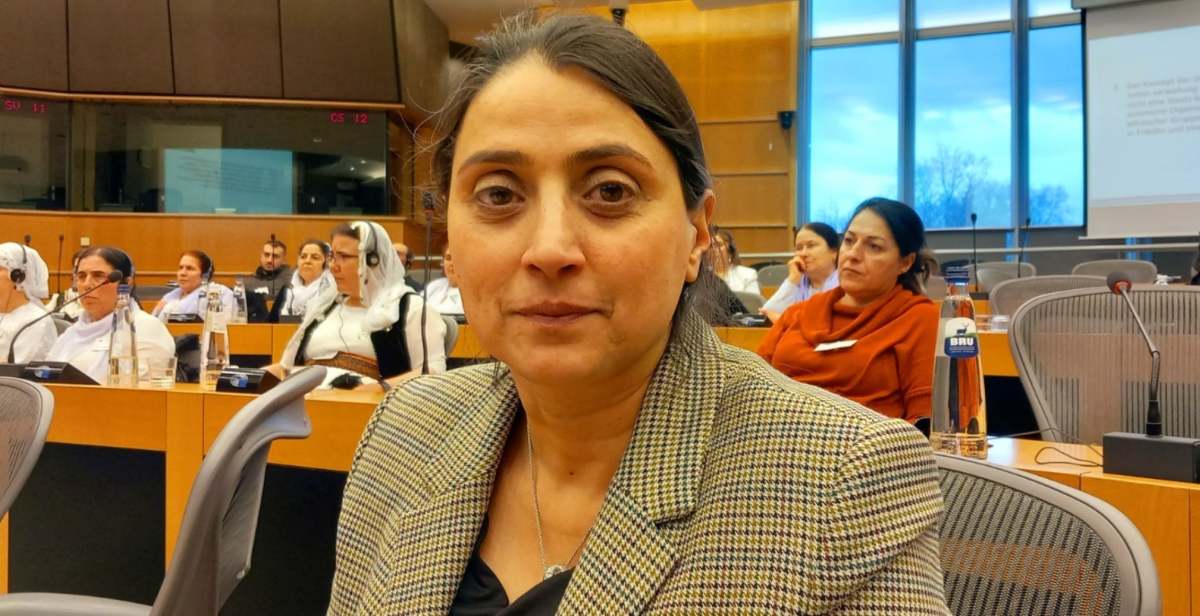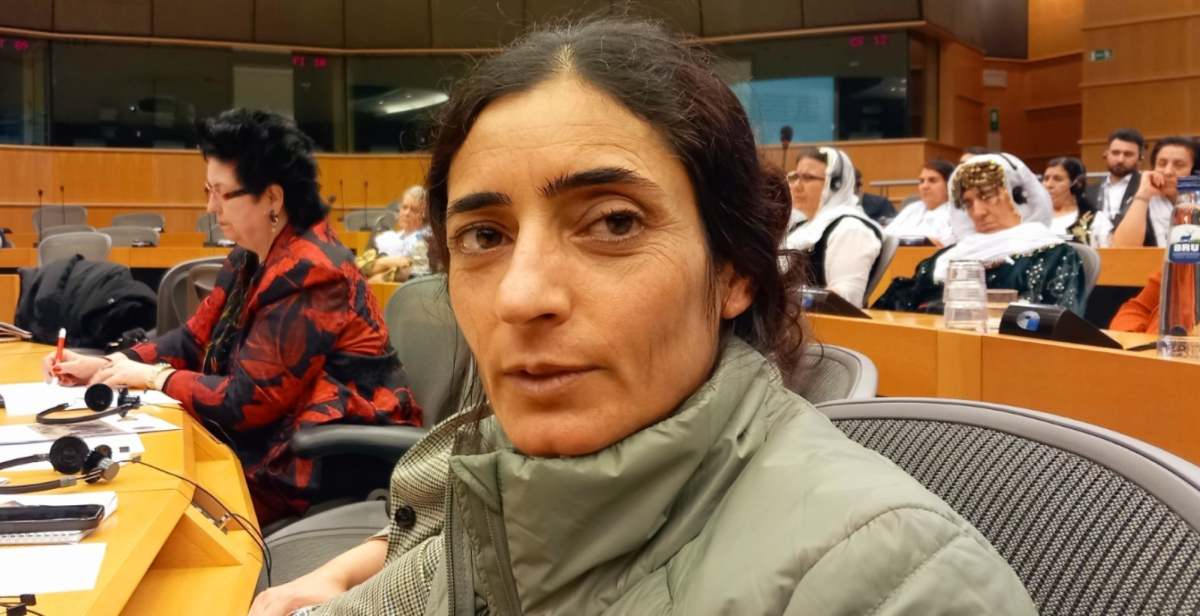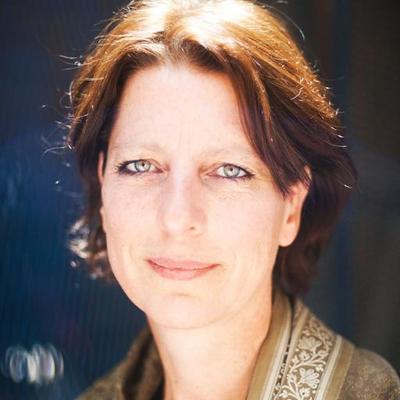Restoring Şengal: Yazidis Gather to Secure Justice and their Future
By Fréderike Geerdink
In two conferences in Amsterdam and Brussels, members of the Yazidi community tried to heal wounds and look at the future, finding strength in coming together. The genocide against the Yazidis, carried out by ISIS, happened ten years ago, in August of this year. Or, better phrased: it began ten years ago, but the violence and denial of rights continue. So the wounds remain open.
“After I escaped from Daesh (ISIS), I knew that if I wanted to heal, I had to go back to Şengal to fight and liberate my land”, Suad Murad Khalaf said during one of the panel discussions in Brussels. She joined the YPJ (Women’s Protection Units), the Kurdish women’s forces in Syria, and is now generally known as comrade Hêza Şengalî, a commander in the YBŞ, the Yazidi women’s forces in Iraq that the YPJ helped to set up. “Also, as an organisation, we had to keep our promise to the Yazidi people.”
Promises kept and promises broken are brought up again and again during two conferences about the Yazidi genocide recently held in Europe. Promises, but also expectations, disappointments, disillusions, and pain. But both conferences left space for hope as well.
The first conference that the author attended was the Yazidi Survivors Conference at the University of Amsterdam, held on the 26th of January. It was organised by the Yazidi Legal Network, an organisation that considers it its mission to assist the Yazidis in achieving recognition of and accountability for international crimes committed by ISIS. The second was organised by the umbrella organisation of the Ezidi Women’s Councils in cooperation with the Union of Êzîdî Associations, both based in Germany, and was held in the European Parliament in Brussels.
The latter initiative was co-organized by Feleknas Uca, a well-known and well-respected member of the Yazidi community in Germany who used to be a Member of European Parliament herself and served two terms in the Turkish Parliament for the Peoples’ Democratic Party (HDP), until the elections of May 2023.

New Conflicts
The Brussels conference was more political and the Amsterdam one more judicial, but the political and the judicial are inextricably entwined. Before the genocide, the Yazidis were a largely unknown group. The genocide radically and tragically changed that, but now, ten years later, their plight is not very much in the picture anymore. The story has judicially and politically become complicated. New conflicts emerged elsewhere in the world and recently, another genocide in Gaza has attracted most of the global attention.
But the Yazidis cannot move on. Their homeland in Şengal (Arabic name: Sinjar), in northern Iraq, is still largely shattered. Tens of thousands of Yazidis are still staying in tent camps in the Kurdistan Region of Iraq, where life is hard and perspectives are grim. Part of the community has found refuge elsewhere, for example, in Europe, Canada, Australia, and New-Zealand, leading to fragmentation that could contribute to the fading away of one of the oldest religions and cultures of the Middle East.
How do you turn the tide? By uniting, that much became clear during both conferences. And by not giving up. As Farhad Shamo Roto, the president of the NGO Voice of Ezidis and opening speaker of the conference in Amsterdam, said, “Giving up on us would be a great thing for ISIS.”
Another potential solution: uniting to bring perpetrators of the genocide to justice, for starters. This has proven to be extremely difficult for a variety of reasons, some of which were discussed in both Amsterdam and Brussels. The experience and knowledge of the participants gave important insights into the everyday struggles of survivors, lawyers, prosecutors, and advocacy groups.
What we know, for example, is that prosecuting those responsible for the genocide is difficult because it is hard to link specific crimes to specific suspects. Who exactly kidnapped that specific victim, and how convincing can the case against him be made in court? Which women exactly assisted their husbands in the sexual exploitation of which Yazidi women, and is the role these women played enough for a conviction of which crime exactly? And which country even has the legal jurisdiction to prosecute whom?
Across Borders
The speeches of those working with these questions on a daily basis gave profound extra insights into these difficult issues. In Amsterdam, survivor Kawla Ali was one of the speakers. She was a captive of ISIS for five years and is now connected to the Farida Global Organisation. She is originally from the village of Kocho (where Nobel Peace Prize laureate Nadia Murad is also from), one of the last villages to be liberated in 2017. Kawla Ali said: “For survivors, interviews about what happened to them are traumatising them anew. Their testimonies are important but they shouldn’t be asked to share what happened to them again and again.”
This was acknowledged by all in attendance. To make sure that survivors are treated as respectfully as possible and that they are not unnecessarily re-traumatized, cooperation is of utmost importance. Cooperation across borders, but also across groups of professionals who work on bringing perpetrators to trial.
One of the attendants in Amsterdam was public prosecutor Anne van Dooren, who works for the International Crimes Unit of the Dutch Public Prosecution Service. She said she was investing a lot of time into building relationships with survivors and the NGOs representing them, in order for those who give testimony to feel safe. “To successfully prosecute, we need the personal involvement of victims. But we are also often looking for a needle in a haystack when it comes to evidence,” she said, referring to specific evidence that can be linked to a specific location and crime, and to a specific victim. “So interviews with survivors have to be meticulously done, but very carefully.”
A joint investigation team was set up with Sweden, Belgium and France, in which also UNITAD (United Nations Investigative Team to Promote Accountability for Crimes Committed by ISIS) plays a role. “Talking to one team, means other teams can use the information in their investigations too. But it remains difficult. For example, a survivor doesn’t know if a perpetrator had a Dutch passport or Swedish, or which information is important for which specific case. To gather as much useful information as possible in interviews, remains difficult.”
The topic was high on the agenda at the conference in the European Parliament in Brussels as well. Lawyer Rojda Arslan remarked that the people who carried out the genocide were of at least eighty different nationalities. On top of that, crimes were committed in both Iraq and Syria. Who is to prosecute whom? Which law applies? Which trajectory serves the survivors best? Arslan added another layer, though: “Several countries have recognised the Yazidi genocide, but this recognition comes with responsibilities. One of those responsibilities is to punish the perpetrators. Germany has pioneered prosecuting offenders and also in France and the Netherlands, court cases are ongoing, but what I miss is a coordinated effort between prosecutors across countries.”
Death Penalty
One of the countries that recognised the genocide is the country where it happened: Iraq. At first glance, that offers a good opportunity to punish those who carried out the crime, but the reality is unruly. The country doesn’t have a domestic legal framework to enable the prosecution of international crimes (genocide, war crimes, or crimes against humanity), the result of which is that ISIS members are merely prosecuted for terrorism-related crimes without any investigations being carried out into international crimes and therefore not bringing any justice to the victims.
Another complication is that Iraq has the death penalty. This renders it impossible for UNITAD to share evidence with the Iraqi judiciary system. Especially now that the UNITAD mission is about to end in September this year, much to the shock of survivors and their representative organisations, the fear has intensified that most of the perpetrators will never be held to account.
When it comes to crimes committed, especially against women, lawyer Arslan has dedicated part of her legal struggle to try to get sexual crimes added to the Genocide Convention as a genocidal act, just as they were previously recognised as a war crime.
Meanwhile, the situation on the ground in Iraq remains dire for the Yazidi community as well. Şengal city is still largely in ruins, as are most of the towns and villages around it, which together constitute the Yazidi homeland. Tens of thousands of people remain stuck in camps in Duhok in the Kurdistan Region of Iraq, some three hours (and many checkpoints) northeast of Şengal. And even though the conference in Amsterdam was mainly judicial, here too, political points were made.
In his opening speech, Farhat Shamo Roto of Voice of Ezidis criticised the lack of protection by the international community and added, “Further atrocities can happen.” He explicitly pointed to a hate speech campaign in Iraq last year, which led to actual violence in Şengal. “We want justice,” he said, “but we also need peace.”
Not the First
He was referring to an incident around a mosque in Şengal last year, a story that was built on misinformation and led to dangerous incitement against Yazidis. Such anti-Yazidi sentiments can easily be triggered in a country where Yazidis have forever been discriminated against, where many people, both in the Kurdistan Region and in Iraq proper, still see them as apostates. The genocide that started ten years ago was by far not the first in the long history of the Yazidis. As Wahhab Hassoo, a Dutch Yazidi activist and political scientist who founded the NL Help Yezidis Foundation (the Netherlands Helps Yazidis), said at the Amsterdam conference: “We are a closed community, which is based on all the atrocities committed against us in history.”
But the politics go much further than that. At its core, politics is about self-determination. In August 2014, it became very clear that both the Iraqi army and the Peshmerga of the KDP, the leading party in the Kurdistan Region of Iraq that reigned over Şengal at the time, were not committed to protecting the Yazidis against ISIS’ genocidal attack.
It was the PKK (Kurdistan Workers’ Party) guerrillas that rushed from the mountains to Şengal to try to repel the ISIS attack. PKK fighters opened a corridor from the Şengal mountain, where the community had fled in panic, to safety in the Rojava region of Syria. From across the border, the forces of the YPG and (women’s forces) YPJ, who adhere to the same Democratic Confederalist ideology as the PKK, played their part and welcomed the community.
This ideology revolves around self-determination and self-defense. The PKK helped set up the YBŞ (Şengal Resistance Units) right after the genocide started. The community had to be able to defend itself instead of trusting others to do it. A PKK-guided and community-led initiative started to organise autonomy for the Yazidis in their homelands. The goal was to no longer be ruled by Baghdad or Erbil (the Kurdistan Region capital and KDP stronghold), but to rule themselves.
The international community has not only not supported the initiative; it has actively frustrated it. The most explicit frustration is the adaptation of the so-called Sinjar Agreement between Baghdad and Erbil, under the auspices of the United Nations Assistance Mission for Iraq and supported by Turkey. Part of the plan is to remove ‘illegal forces’ from Şengal, and even though it is not made explicit, the YBŞ is one of them.

Legal Forces
Hêza Şengalî, who is a commander in the YBŞ, expressed her opinion on that in a panel discussion in the European Parliament in Brussels:
“We are supposed to leave Şengal, but we are the local self-defence forces, so where are we supposed to go? We are not going anywhere, we won’t let anybody else defend us. We are not a legal force? What have the legal forces ever done for us?”
Feleknas Uca said, like other speakers in Brussels, that a no-fly zone must be declared and implemented for Şengal, so Turkey’s bombings stop. Uca: “This will make Şengal safer, and give people stuck in the camps in the Kurdistan Region a better opportunity to return home.” She accused European politicians of not being informed enough about the situation: “Ambassadors only travel to Erbil and Baghdad, never to Şengal. They need to go there too.”
The fact that Turkey supports the Sinjar Agreement is telling. Turkey has basically nothing to do with Şengal (Şengal is the name in Kurmanci Kurdish, which is the mother tongue of the Yazidis), but it was involved in the agreement because it considers the YBŞ to be a terrorist organisation because it was set up by the PKK and adheres to their principle of self-defense.
As such, Turkey has been bombing Şengal often since the genocide started and has killed several YBŞ members and destroyed YBŞ locations and civilian infrastructure. One member of the audience in the European Parliament in Brussels said:
“Nobody in Şengal has ever thrown as much as a stone at Turkey, and still, Turkey keeps bombing us.”
The KDP supports Turkey in the war against the PKK and Baghdad wants the bombings to stop but has no leverage to demand it from Turkey, so the removal of ‘illegal forces’ was put in the agreement to satisfy Iraq’s northern neighbour. Simultaneously, this removal will help restore KDP’s and Baghdad’s influence. While the Yazidis pay the price.
The insecurity about the future of the community in Iraq, also leads to an ongoing wish for Yazidis to relocate to other countries. Especially in the first few years after the genocide, the relocation efforts were supported by several countries, among them Germany, Canada, Australia, and New Zealand. But with time, the flaws of the policies practiced by western countries became clear. For example, only direct family members can join a Yazidi who has made it to Europe as a refugee, and in general, nobody from the extended family can.
Lawyer Rojda Arslan said during the Brussels conference: “European countries have to re-evaluate that policy. Thousands of Yazidi men have been murdered in the genocide, and families have been destroyed. The community needs the opportunity to come together again in different ways, and that includes members of extended families.”
Two Children
Some 2,700 women remain missing. Some of them must have died alongside the ISIS members who held them captive; some of them may still be alive. Some ISIS families have moved to Turkey and taken the Yazidi women with them, and occasionally such women are rescued. More often, Yazidi women are rescued from Al-Hol camp, where ISIS women and their children have been kept since ISIS was territorially defeated in 2018. The camp is guarded by Kurdish.
The most recent case is that of a 24-year-old woman who was brought to safety with her two children. She returned to her family, but no news has been shared about the children. The Yazidi community welcomes back the women who were kidnapped but does not accept the children of ISIS men, who are often placed in orphanages. A film shown at the end of the conference in Amsterdam, Mediha, mentioned it as one reason some Yazidi women make the painful choice not to be rescued, in order not to be separated from their children.
Add to that the horrifying fact that although ISIS may have been territorially defeated, the organisation still exists and is actually gaining strength again both in Syria and Iraq. The fight against ISIS, mainly carried out by the SDF (Syrian Democratic Forces), of which the YPG and YPJ form the backbone, is seriously hampered by Turkey’s rejection of the SDF and its insistence to link it with ‘terrorism’. The SDF and the whole autonomously ruled northeast-Syria are subject to an intensified bombing campaign, in which, just like in Şengal, both military structures and vital civilian infrastructure are routinely targeted.
It is not that there is no good news. Former Member of European Parliament and former Member of the Turkish Parliament Feleknas Uca said: “We should not only see the pain of your community but also the resistance. We must praise the heroes who are fighting for all the people.”
Also, reconstruction efforts were highlighted. The importance of that must not be underestimated, as the destruction of cultural heritage was part of the genocide, as it intended to annihilate a community and its culture and religious practices, which are inextricably connected.
In the margins of the Brussels conference, Çiçek Yıldız of the Central Association of Yazidi Associations, located in Germany, said they visited Şengal last year. With Yıldız remarking: “We saw that a temple that was destroyed in 2014, is being rebuilt. We saw Yazidi and Arab communities of women work on reconciliation. I think that if reconstruction progresses and the standards of living become better, people will start to return to Şengal.”
According to Feleknas Uca, people are already returning: “Since three or four months, a few hundred families have left the camps to return.”
Suad Murad Khalaf, who now goes by Hêza Şengalî, did eventually return to her homeland. But not in 2015, a year after the genocide, when the city of Şengal and part of the villages in the region were cleared from ISIS, because at the time, she was still held hostage by ISIS. But in May 2017, when the local Yazidi forces, in cooperation with the PKK, Peshmerga, and the Iraqi Army kicked the remainder of ISIS out. She was also part of the successful campaign against ISIS in Raqqa, the city where she herself had been sold in a market when she was still in the brutal organisation’s claws.
Did her revenge heal her, I wondered? Hêza replied, “We cannot heal because the genocide continues. We cannot forget because so many women and girls were kidnapped and not all of them have returned. The fighting continues.”




Comments are closed.